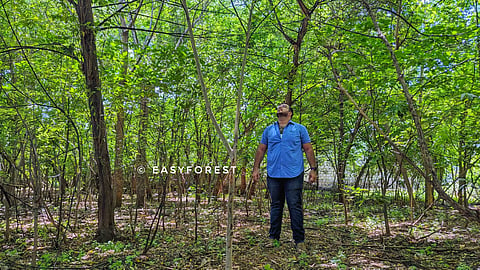EasyForest’s Dense Forests: Pioneering Sustainable Green Spaces in Urban India
As cities expand at an unprecedented rate, the need for sustainable and eco-friendly development has never been more urgent. EasyForest is leading the charge in this area, focusing on the development of dense and sacred forests in both urban and rural settings across India. By leveraging the Miyawaki method—a proven technique for rapid forest regeneration—and drawing on the wisdom of traditional practices from Nammazhwar Ayya, EasyForest is turning barren lands into flourishing ecosystems that are not only beautiful but also beneficial for the environment and the community.
In an interview with EasyForest Founder Ramachandran, we explore the details of the company and its offerings.
What companies can benefit from your Dense Forest services?
EasyForest’s services are designed to meet the diverse needs of a wide range of clients. From real estate developers looking to add green spaces to new projects, to corporations with Corporate Social Responsibility (CSR) mandates, and manufacturing industries aiming to comply with Pollution Control Board (PCB) regulations, We have a solution for everyone. The hospitality sector, particularly resorts and hotels, also benefits from the company’s expertise in creating lush, green environments that enhance guest experiences.
Currently, we are actively collaborating with prominent real estate developers such as CasaGrand and True Value Homes. We are also fervently seeking to engage with other prominent developers, including Prestige, Appaswamy, TVS Emerald, and Hiranandani, to further expand our green footprint. By working closely with these developers, we aim to incorporate more green spaces into urban landscapes, providing cleaner air, cooler microclimates, and healthier living environments for city dwellers.
How much space do these forests require?
To plant a dense forest we need a minimum of 1500 – 2000 square feet.
For Sacred forests like Panchabootha Vana, Panchavati Vana, Nakshatra Vana, etc., we need atleast 250 sqft of land.
What impact will Dense Forests have?
In densely populated metro cities like Chennai or Hyderabad the benefits of urban forests are manifold. Our forests offer significant health, environmental, and economic advantages. These dense forests contribute to improved air quality, microclimate impact, and reducing health risks such as asthma and lung infections caused by dust and pollution. Furthermore, they help mitigate the urban heat island effect, creating sustainable and inclusive green spaces, which require zero maintenance after the first two years.
In industrial areas, the presence of dense forests plays a crucial role in absorbing pollutants, reducing noise and dust pollution, and enhancing the overall environmental compliance of manufacturing units. These green belts act as natural buffers, improving the aesthetic appeal of industrial zones while simultaneously supporting local biodiversity and helping industries meet environmental regulations more effectively. For example, industries in Tamil Nadu have to maintain green cover on at least 33% of their land. We help them to effectively plan that
What does the future look like for EasyForest?
Looking to the future, EasyForest has ambitious plans to expand into new sectors, including the National Highways Authority of India (NHAI), automobile manufacturers, and emerging manufacturing industries.
We are also exploring opportunities to develop sustainable communities and tech parks in major cities, integrating forests into urban planning to create greener, more livable spaces.
Have you received any funding for your company?.
We're a bootstrapped company as of now. But we are actively looking for angel investors or Venture capitalists.
We are seeking investments (around USD 15 – 20 million) to develop sustainable communities and tech parks in metro cities, integrating dense and sacred forests into these urban spaces. According to a survey by CBRE, sustainable housing has seen a significant increase in recent years. With a projected Return on Investment (ROI) of 35-45%, we are confident in our ability to deliver both environmental and economic value to our stakeholders.
Conclusion
As our urban areas continue to grow and evolve, EasyForest’s commitment to integrating nature into urban landscapes represents not just a forward-thinking vision but a vital step toward a more sustainable future. “Our goal is to make every barren land green and self-sustaining,” concludes Ramachandran. By turning this vision into reality, EasyForest is not only changing the landscape of urban India but also setting a standard for sustainable development
You can get more information about Easyforest at their website at www.easyforest.in or call them at +91 8754303296.
Disclaimer: This article is published in association with EasyForest and not created by TNM Editorial.

